 Who is the blogger?
Who is the blogger?
To see a simple English version of reviews about some of the movies, click on the ESL section of Midnight Oil.
Entries in drama (34)
East of Eden (1955)
 James Dean gives an exceptional performance in this now classic film of John Steinbeck’s classic novel of the same name. A movie well worth seeing, “ East of Eden”, with a strong supporting performance from Julie Harris as Abra, shows off Jimmy Dean with sophistication and poise in his “rebel” character. Presented as one of a trilogy of films directed by Elia Kazan on TVO’s Saturday Night at the Movies.
James Dean gives an exceptional performance in this now classic film of John Steinbeck’s classic novel of the same name. A movie well worth seeing, “ East of Eden”, with a strong supporting performance from Julie Harris as Abra, shows off Jimmy Dean with sophistication and poise in his “rebel” character. Presented as one of a trilogy of films directed by Elia Kazan on TVO’s Saturday Night at the Movies.
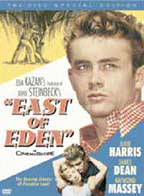 They were at it again - my two munchkins brawling in the backseat: “She did it to me first!” – “But he said that I was a . . .” – “She has her stuff on my side!” – And on and on it goes. Often enough it comes to blows before the emotions of the moment blow over. Sibling rivalry, common enough phenomenon that it is, can be so draining for a parent. . . .
They were at it again - my two munchkins brawling in the backseat: “She did it to me first!” – “But he said that I was a . . .” – “She has her stuff on my side!” – And on and on it goes. Often enough it comes to blows before the emotions of the moment blow over. Sibling rivalry, common enough phenomenon that it is, can be so draining for a parent. . . .
Read the archived entry on Midnight Oil for "East of Eden" here.
Catch the video trailers for "East of Eden" here.
Elmer Gantry (1960)
 Burt Lancaster does some very interesting work in both "Elmer Gantry" (1960) INDb and "The Swimmer" (1968) INDb. Both films prove to be revelatory in both the figurative and the literal sense:) These screen adaptations of literary vehicles might leave you slightly off balance, but still glued to the screen.
Burt Lancaster does some very interesting work in both "Elmer Gantry" (1960) INDb and "The Swimmer" (1968) INDb. Both films prove to be revelatory in both the figurative and the literal sense:) These screen adaptations of literary vehicles might leave you slightly off balance, but still glued to the screen.
This movie was paired with a second feature, "The Swimmer" when originally aired on TVO. See the entire archived entry.
Catch the video trailer for "Elmer Gantry"
Laura (1944)
Picture Perfect
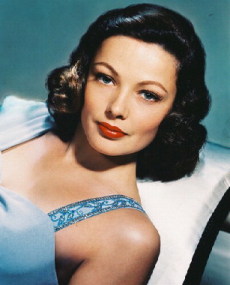 Gene Tierney’s breathtaking beauty in the title role adds to the performance of the ensemble cast accompanied by the memorable score composed by David Raksin. It all goes together to make this unforgettable classy film noir classic. TVOntario’s Interviews, (Aug.18,’07) include contributions from the leading man, Dana Andrews and director, Otto Preminger. The Interviews contain revelations into the evolution of this wonderful film that are almost as enjoyable as the plot reversals contained in the film itself .
Gene Tierney’s breathtaking beauty in the title role adds to the performance of the ensemble cast accompanied by the memorable score composed by David Raksin. It all goes together to make this unforgettable classy film noir classic. TVOntario’s Interviews, (Aug.18,’07) include contributions from the leading man, Dana Andrews and director, Otto Preminger. The Interviews contain revelations into the evolution of this wonderful film that are almost as enjoyable as the plot reversals contained in the film itself .
See the "Laura" Video Trailers here
My tastes in home décor definitely run toward the classic . A mantle clock under glass sports 19th century ladies and gents caught up in an eternal circular dance. A finely upholstered wing chair sits beside a gas fireplace accompanied by a brass table lamp inviting one to read into the late hours of the night. Lace curtains, a finely finished oval oak coffee table and a portrait of two young ladies in linen circa 1830 over the mantelpiece complete the picture.
It sounds so idyllic and serene – and so it was when I first designed it all in my mind’s eye. The original design for my living room didn’t take into account the stresses and strains of the invasions of real life: LEGO strewn around the room with my son’s creative structures filling up all available table space and more, protective throws on the furniture continually askew, cookie crumbs under the couches, the clock dancers’ whirling waltz interrupted by batteries that have ceased to function.
Ahh, this is the life. At least, this is my life.
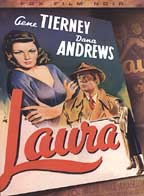 In the opening scene of the film, we first meet Laura through taking a virtual walking tour of her home. In the days before “video visits” in online real estate listings, it must have been something of a novelty to inspect the interior of another person’s home in their absence through the camera lens – a kind of early video voyeurism. Waldo Lydecker, ably played by Clifton Webb, is more than happy to oblige as the tour’s host. Lydecker’s character provides voice over commentary for the house tour and for the rest of the film.
In the opening scene of the film, we first meet Laura through taking a virtual walking tour of her home. In the days before “video visits” in online real estate listings, it must have been something of a novelty to inspect the interior of another person’s home in their absence through the camera lens – a kind of early video voyeurism. Waldo Lydecker, ably played by Clifton Webb, is more than happy to oblige as the tour’s host. Lydecker’s character provides voice over commentary for the house tour and for the rest of the film.
The camera pans over various art objects in the apartment coming to rest on an oil painting of Laura herself. The portrait is very lifelike and very beautiful (It was a photo of the dazzling Gene Tierney, painted over to look like an oil portrait). The narrator intones, “I, Waldo Lydecker, was the only one who really knew her.” As we soon learn, Lydecker has no problems assuming that his opinion is the final word, in fact the only word worth knowing, on just about any subject.
 Playing opposite Waldo Lydecker is Mark McPherson (Dana Andrews), a tight-lipped police detective who also knows his own mind, although he is perhaps less hasty in forming and reforming his opinions about a situation. Andrews plays the part of the detective as holding things very close to his chest, with hardly a ripple of emotion permitted to escape. He keeps himself calm by playing a little handheld pinball game. McPherson says that it helps him to keep his mind clear.
Playing opposite Waldo Lydecker is Mark McPherson (Dana Andrews), a tight-lipped police detective who also knows his own mind, although he is perhaps less hasty in forming and reforming his opinions about a situation. Andrews plays the part of the detective as holding things very close to his chest, with hardly a ripple of emotion permitted to escape. He keeps himself calm by playing a little handheld pinball game. McPherson says that it helps him to keep his mind clear.
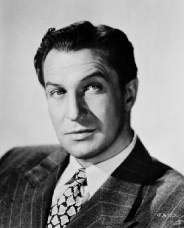 The trio of men who surround Laura is completed by Shelby Carpenter, a Southern playboy, labelled a “male beauty in distress” by Lydecker. Carpenter’s prime function in life seems to be to mooch off of those who can afford his company. His other prime function, at least in this story, is to serve as the all too obvious prime suspect in Laura’s murder. As noted in the Interviews (Aug.18,’07), a decision was made to heighten the contrasts in personality of the three male characters so that they would play off one another.
The trio of men who surround Laura is completed by Shelby Carpenter, a Southern playboy, labelled a “male beauty in distress” by Lydecker. Carpenter’s prime function in life seems to be to mooch off of those who can afford his company. His other prime function, at least in this story, is to serve as the all too obvious prime suspect in Laura’s murder. As noted in the Interviews (Aug.18,’07), a decision was made to heighten the contrasts in personality of the three male characters so that they would play off one another.
As for the character of Laura herself, it seems to be a case of “absence makes the heart grow fonder”. Her conspicuous absence during the first part of the film adds all the more mystery to her character and suspense to the plotline. Laura seems to be altogether too lovely to be real; the “girl next door”, an independent self-made woman, smart and sexy, sweet and sophisticated.
 Laura is a lot like the theme music that David Raksin has composed for her . The repetition of the “Laura” theme music, although it comes up over and over again in different settings and at different tempos, is never tiresome, but somehow manages to add to the haunting beauty of Laura herself. No wonder detective Mark McPherson falls for her like a ton of bricks, sight unseen. In fact, everyone around Laura seems to be bewitched by her. They all adore her from Betsy the parlour maid to that cranky old columnist, Lydecker, who seems so full of himself that there couldn’t possibly be room in his life for anyone else.
Laura is a lot like the theme music that David Raksin has composed for her . The repetition of the “Laura” theme music, although it comes up over and over again in different settings and at different tempos, is never tiresome, but somehow manages to add to the haunting beauty of Laura herself. No wonder detective Mark McPherson falls for her like a ton of bricks, sight unseen. In fact, everyone around Laura seems to be bewitched by her. They all adore her from Betsy the parlour maid to that cranky old columnist, Lydecker, who seems so full of himself that there couldn’t possibly be room in his life for anyone else.
But there it is. Waldo Lydecker has been bewitched. Or perhaps possessed is a better word for it. There is this tricky business of who possesses whom in this odd December/May relationship between Waldo and Laura. As the story unfolds, it becomes clear that Lydecker is not only frightfully possessive about certain objects of art that he wishes to reclaim from Laura’s apartment after the investigation, but that he is overly attached to the young lady herself. Making use of a razor sharp wit and his poison pen (a goose quill dipped in venom, by his own report), Lydekker manages to dispose of Laura’s suitors quite handily one by one.
And what delicious dialogue has been served up for Lydecker via Vera Caspary’s novel of the same name and the team of screenwriters! Oh my, Waldo: “Young woman: either you have been raised in some incredibly rustic community where good manners are unknown, or you suffer from the common feminine delusion that the mere fact of being a woman exempts you from the rules of civilized conduct. Possibly both.” No wonder Clifton Webb was lured back to Hollywood from the New York stage after an absence of almost 20 years by such a scrumptious part as Waldo Lydecker. It was a great success for Webb as an actor, relaunching an onscreen career.
 Laura has evidently had a profound effect on those around her (including some, like McPherson, who haven’t even met her yet in person). Lydecker claims that Laura’s effect on him has been an entirely beneficial one: “Laura considered me to be one of the wisest, the wittiest, the most interesting men she had ever met. I was in complete accord with her on that point. . . .You may not understand this but I tried to become the kindest, gentlest, most sympathetic man in the world.” McPherson quips in response, “Have any luck?”
Laura has evidently had a profound effect on those around her (including some, like McPherson, who haven’t even met her yet in person). Lydecker claims that Laura’s effect on him has been an entirely beneficial one: “Laura considered me to be one of the wisest, the wittiest, the most interesting men she had ever met. I was in complete accord with her on that point. . . .You may not understand this but I tried to become the kindest, gentlest, most sympathetic man in the world.” McPherson quips in response, “Have any luck?”
Although it may be in doubt in the beginning, by the end of the film we find out that Lydecker has not had much luck either in remaking himself or in keeping Laura’s affections to himself. Lydecker has had some remarkable success in maintaining appearances, thanks to his native intelligence and his wonderful storytelling abilities, but in the end, that’s all that it is; a well crafted story that sounds very convincing on the surface.
Laura reveals to Mark that Lydecker has this uncanny ability to rewrite history, not only for his hearers, but also for himself. In explaining to the detective why she is forever grateful to Lydecker for giving her a start in her career, Laura lets slip that the whole incident of the pen endorsement was a story Lydecker invented for his column. The truth about the situation was considerably less spectacular and less complimentary to both parties involved. It was all a skilfully woven fabrication that takes everyone in(including the audience).
 It takes Laura some time to sort out the truth from the fiction. It also takes a process of various unveilings in order for her to sort out her feelings towards the men in her life. Of course the process is as fascinating and as entertaining as the Dance of the Seven Veils. It all culminates with a dramatic rescue by the knight in shining armour (Andrews) and the unmasked villain (Lydecker)getting his comeuppance.
It takes Laura some time to sort out the truth from the fiction. It also takes a process of various unveilings in order for her to sort out her feelings towards the men in her life. Of course the process is as fascinating and as entertaining as the Dance of the Seven Veils. It all culminates with a dramatic rescue by the knight in shining armour (Andrews) and the unmasked villain (Lydecker)getting his comeuppance.
If only things in real life in complicated and dangerous relationships could get sorted out as easily, preferably within a 2 hour timeframe. It would be so much easier and so much more satisfying than the kinds of painful and confusing relational gymnastics that happen in the real world. But hey, this is Hollywood ! Pass the popcorn and let’s all settle down for a cozy evening’s tête à tête with a wonderful gem like “Laura”.
Suggested Reading:
-
INDb reports that the character of Waldo Lydecker is based loosely on the real life personage of Alexander Woollcott
-
Dangerous Liaisons: seeing your way through a codependent friendship
-
Avoid being someone’s prized possession: be loved for who you really are
-
Breakawy: escaping the shark pool of an emotionally abusive relationship
-
Hero to the rescue: grounds for a safe relationship
East of Eden (1955)
 James Dean gives an exceptional performance in this now classic film of John Steinbeck’s classic novel of the same name. A movie well worth seeing, “ East of Eden”, with a strong supporting performance from Julie Harris as Abra, shows off Jimmy Dean with sophistication and poise in his “rebel” character. Presented as one of a trilogy of films directed by Elia Kazan on TVO’s Saturday Night at the Movies.
James Dean gives an exceptional performance in this now classic film of John Steinbeck’s classic novel of the same name. A movie well worth seeing, “ East of Eden”, with a strong supporting performance from Julie Harris as Abra, shows off Jimmy Dean with sophistication and poise in his “rebel” character. Presented as one of a trilogy of films directed by Elia Kazan on TVO’s Saturday Night at the Movies.
Video preview from TVO here.
Paradise Lost
They were at it again - my two munchkins brawling in the backseat: “She did it to me first!” – “But he said that I was a . . .” – “She has her stuff on my side!” – And on and on it goes. Often enough it comes to blows before the emotions of the moment blow over. Sibling rivalry, common enough phenomenon that it is, can be so draining for a parent.
And then there is all the relationship stuff about working through wrongdoing, repentance, forgiveness and reconciliation. It’s amazing how many times we go through it. My daughter is especially prone to veering off the straight and narrow in a fit of temper that needs a course correction along the way.
She climbs up on my knee after a particularly stormy session and we talk calmly about what has happened. In those moments, she needs me to tell her once again that Mommy loves her no matter what she does. We try to talk about what a new and brighter future will look like, avoiding the mistakes of the past. Kisses and hugs and reassuring words follow in abundance. It’s all a part of growing up.
At least it is for my kids. When my son gets his feelings hurt in the latest spat with his sister or in some confrontation with his parents, he just runs off to his room. The stakes were considerably higher in the film, East of Eden .
 As a story about the conflicts of emerging adults, sibling rivalry in the case of Cal and Aron Trask involves slightly more serious consequences. After feeling betrayed by his girlfriend’s shifting allegiances and the earth shattering revelations of his brother concerning their mother’s true identity, Aron runs off to enlist in World War I, presumably to his death on some European front of military action.
As a story about the conflicts of emerging adults, sibling rivalry in the case of Cal and Aron Trask involves slightly more serious consequences. After feeling betrayed by his girlfriend’s shifting allegiances and the earth shattering revelations of his brother concerning their mother’s true identity, Aron runs off to enlist in World War I, presumably to his death on some European front of military action.
The characters of East of Eden, although they do have the archetypal thing going on, appear to be more fully developed than cardboard cut-out characters of “the good son” and the “the bad son”. Just about everyone, it seems, is more than who they appear to be at first. The father, Adam, a cold and distant figure, is more complex and compassionate than we think at first. The mother, Kate, while still a hardened brothel madame, shows perhaps just a chink in her steely armour which allows for a slight hint of humanity to leak out.
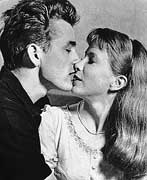 An attempt is made to maintain the epic sweep of the original Steinbeck story through the use of cinemascope. With our rinky-dink 13 inch television screen with bunny ear reception, one has to use quite a bit of imagination to “get the full effect” of the wide-screen experience as it was originally conceived of for the movie theatre. I’m afraid that on only 13 inches worth of screen, the cropped look of cinemascope just ends up being a small and squinty annoyance. It is involvement with the storyline and the thematic material keep the “epic effect” alive for me.
An attempt is made to maintain the epic sweep of the original Steinbeck story through the use of cinemascope. With our rinky-dink 13 inch television screen with bunny ear reception, one has to use quite a bit of imagination to “get the full effect” of the wide-screen experience as it was originally conceived of for the movie theatre. I’m afraid that on only 13 inches worth of screen, the cropped look of cinemascope just ends up being a small and squinty annoyance. It is involvement with the storyline and the thematic material keep the “epic effect” alive for me.
And there is more than enough of that kind of stuff to go around. Allusions hearken back to the biblical Cain and Abel story. An attempt is made to delve into the origins of human behaviour and human nature. Cal Trask, in trying to figure out who he is and why he is the way he is, takes 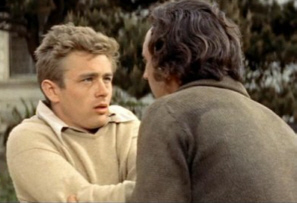 us all on a journey to the outer reaches of the human soul. We see Cal develop from a brooding, reactive youth and evolving into the first steps of responsible adulthood by the end of the film.
us all on a journey to the outer reaches of the human soul. We see Cal develop from a brooding, reactive youth and evolving into the first steps of responsible adulthood by the end of the film.
In the end, Cal quotes some of the good stuff that he got from his dad and demonstrates that he is, in some measure, trying to put it into practice: “A man has a choice and it’s a choice that makes him a man.”
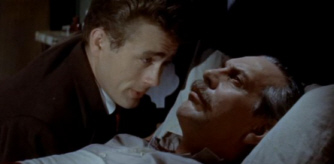 Cal chooses to stay with his ailing dad in his final days instead of just making the easy choice to “take the money and run”.
Cal chooses to stay with his ailing dad in his final days instead of just making the easy choice to “take the money and run”.
Funny that. One of Adam Trask’s less than shining moments revolves around the reading of Psalm 32 at the dinner table. Cal reads the Scriptures aloud with a defiant emphasis on reading out the verse numbers. (His father, Adam, repeatedly tells him this is not necessary.) Because the focus of the moment is on the relational conflict between the father and the son and all of their unresolved issues, the way Cal reads the psalm aloud becomes more important in this scene than anything that the Scriptures actually have to say. Bible reading becomes background noise; a device for illustrating the emotional tone of the dramatic conflict.
 An irony is of course intended by the author, Steinbeck. This particular psalm is actually the recounting of a very passionate and emotional experience of personal forgiveness and reconciliation on the part of the psalmist. It’s not just a droning background noise of boring and irrelevant “religious speak” as Cal hears it to be. The psalm depicts in ancient poetry the very thing that is obviously missing in the modern day experiences of the film’s characters. Unfortunately, Cal stops at verse 8 and never gets to verses 9 and 10. He is distracted by his dysfunctional relationship with his father. Dean’s character might get to that point later in the film, but for Cal it had nothing to do with reading or understanding the bible. It’s a secular redemption story in operation in this film, making use of biblical language and concepts as a backdrop.
An irony is of course intended by the author, Steinbeck. This particular psalm is actually the recounting of a very passionate and emotional experience of personal forgiveness and reconciliation on the part of the psalmist. It’s not just a droning background noise of boring and irrelevant “religious speak” as Cal hears it to be. The psalm depicts in ancient poetry the very thing that is obviously missing in the modern day experiences of the film’s characters. Unfortunately, Cal stops at verse 8 and never gets to verses 9 and 10. He is distracted by his dysfunctional relationship with his father. Dean’s character might get to that point later in the film, but for Cal it had nothing to do with reading or understanding the bible. It’s a secular redemption story in operation in this film, making use of biblical language and concepts as a backdrop.
 I happened to read psalm 32 a few evenings before I chanced to see this film. My personal experience of reading the psalm again was very different from the “disembodied” version presented in the film. It was very striking to hear these words repeated a couple of days later and put to a very different use by Elia Kazan et al.
I happened to read psalm 32 a few evenings before I chanced to see this film. My personal experience of reading the psalm again was very different from the “disembodied” version presented in the film. It was very striking to hear these words repeated a couple of days later and put to a very different use by Elia Kazan et al.
Ain’t that the way things go? It reminds me of our most recent family bible reading attempt around the Sunday dinner table. In spite of our best efforts to connect and pass on a significant spiritual heritage to our offspring, one kid was standing on her head in her chair and the other petulantly kept asking to play the “game” we did two weeks ago as part of our family time (a game which involved much throwing of teddy bears at each other by way of “spiritual illustration through kinaesthetic action” – it was very popular at the time.).
Sigh. Not much seemed to be getting through. Oh well. So much for transmitting a godly heritage, at least for that particular day. It’s a good thing you get more than one chance at attempting to be a good parent.
 I’m very glad to have finally seen the famous “East of Eden ” in the James Dean trilogy. It was also nice to see the other two Elia Kazan offerings “Viva Zapata” and “A Steetcar Named Desire” on the same night, thanks to TVO. It was definitely a treat.
I’m very glad to have finally seen the famous “East of Eden ” in the James Dean trilogy. It was also nice to see the other two Elia Kazan offerings “Viva Zapata” and “A Steetcar Named Desire” on the same night, thanks to TVO. It was definitely a treat.
Suggested Reading:
-
Fimlmcritic.com on the Method of the Method Actor
-
Refresh my memory on that weird Cain and Abel thing that was happening back there.
-
Forgiveness hurts . . .and heals
-
“Where ya headed Jimmy Dean?”
-
Elia Kazan directed this 2 hour picture to great effect. But who’ve you got in the director’s chair of your life production right now?
Venia: Father and son, a modern-day parable on forgiveness




